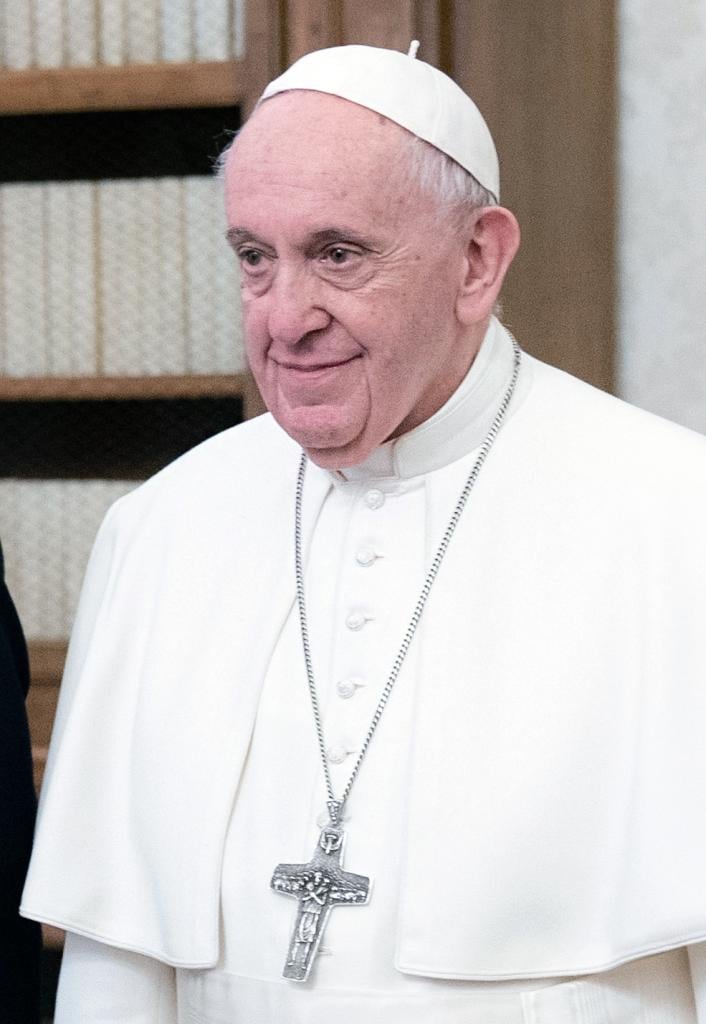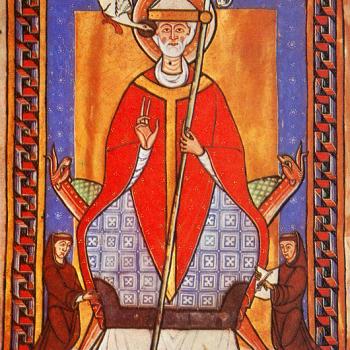In the quite near future, the world’s largest religious institution will be choosing a new head. As everyone knows, Pope Francis is extremely sick, and for a man of his age, there is a strong possibility that he will be leaving us ere long. I am not being ghoulish when I say that: the Vatican is already organizing dry-run funerals. Also, even if he does recover (as I hope), it is very probable that he will resign. What follows here is not an obituary, nor a preliminary draft of one. Rather, I seek to answer a question. When the time comes to elect a new Pope, presumably during 2025, what will happen? And more specifically today, how will the course of these future events be shaped by what has happened during Francis’s time, particularly during the messy last five or so years? I will talk about these issues in three posts.
Who Am I To Judge?
If you follow the regular US media, you probably have a very favorable view of Francis. By common consent, he seems to be a genuinely humble and even saintly man, whose basic instincts seek to reach beyond church dogmas, and especially on matters of sexuality. His best-known phrase is undoubtedly “Who am I to judge?” which initially arose from the case of a gay priest (not, significantly, one accused of any improper behavior with minors). From that perspective, it would be very good indeed to see Francis followed by a like-minded progressive person, who would move still more rapidly to accommodating what in the standard liberal view constitutes the inevitable course of history, towards a more democratic and sexually open church. By that same standard, anyone who opposes Francis or his tradition must be a very bad guy, a hard-core reactionary seeking to drag the church back into the Middle Ages.
In the secular media, virtually all coverage of Catholic and Vatican issues focuses on these sexual matters to the exclusion of any other theological debates. The key touchstones are contraception, divorce, abortion, clerical celibacy, homosexuality, and same sex marriage, with transgender issues rising on the horizon. A good Pope will change church stances on those things, a bad pope won’t, end of story. Onward to the Third Vatican Council!
The Francis story is considerably more complex than this account might suggest, and in several key areas, the differences matter so much because they will certainly have an impact on the succession issue. Let me stress one thing here. I am going to make some negative comments about Francis and his papacy, but that is absolutely not meant to present any kind of balanced evaluation. I am well aware of the wonderful influence he has had on so many people, for whom he is a genuine spiritual hero, an authentic face of Christianity. See today’s New York Times essay by David Gibson on Francis as a “lonely moral voice” in an evil world. For all I know, Francis might be a saint: Who am I to judge?
I am not attempting here to address Francis’s positive accomplishments. I just say that there is another side that has been in the news in the past few years for anyone who cares to pay attention, and which, crucially for my present purposes, will affect decision-making in the near future. I make three main points.
Francis and Abuse
First, over the past decade, Francis’s papacy has been much more scandal-ridden than non-specialists might assume, and there are many good reasons for primates to have criticized his regime.
I say immediately that Francis himself has never been accused of personal misconduct, sexual or otherwise. But repeatedly, there have been cases, mostly arising from South America, where senior clerics have been credibly accused of serious sexual misconduct or abuse, and consistently, Francis has failed to respond in any credible way, even when he assuredly knew what was happening. He has defended or promoted the accused perpetrators while denouncing the victims. Throughout, Vatican interventions have been deliberately opaque, and public statements wildly misleading. In some instances of historical abuse, you can make the case that standards and approaches were very different in earlier eras, and we have to understand the charges against that background: we must not retroject our modern values and perceptions. Those arguments do not apply here. We are talking about the 2010s and 2020s.
I won’t go into these recent cases in detail here, but you can check out the serial horror stories of (in Argentina) Fr. Julio Grassi, Fr. Ariel Alberto Príncipi, and Bishop Gustavo Zanchetta, and in Chile, Fr. Fernando Karadima and Bishop Juan Barros Madrid. The Zanchetta case was egregious, and if it had occurred in the context of any other church leader in modern times, it would certainly have forced a resignation. What Francis did and did not do in that case alone went way beyond the misconduct that recently forced the removal of Anglican Primate Justin Welby. See also Francis’s response to the case of artist Fr Marko Rupnik.
That whole “Who am I to judge?” thing gets old fast.
It is not just sexual reactionaries who denounce Francis and his cliquey and closed administration, and who want to see a fundamental change.
Francis and Authority
Second, Francis is a liberal on many issues, but he is very partisan, and remarkably intolerant with rival opinions. After decades of accommodation, his suppression of the Latin Mass has been surprisingly stern. Far from being an unworldly hermit, he has been very politically active to ensure his legacy, and that shows especially in his choice of cardinals. Of 138 cardinals whose age makes them eligible to vote for the next Pope, an impressive 110 are Francis appointments.
In this as in other matters, never forget that Francis grew up in Peronist Argentina, and you so often see the legacy of that authoritarian/populist approach, along with the clientelism that so often emerged in his easygoing treatment of errant bishops.
Also reflecting that Argentine background is his conspiracy-mindedness, his dietrismo, his quest for the secret enemies who are really pulling the strings on any given issue. I posted about that a couple of years ago in the context of Francis’s ugly comments about Russia and Ukraine.
Francis and Unity
Third, we come to what we might call the elephant in the room, or in the Papal audience chamber, namely the delicate political balances within the church, which Francis has handled very badly indeed.
As is well known, most Christian churches have for a generation been divided over various issues, mainly arising from sexuality. The global fault lines normally run between a conservative South (mainly Africa) and a liberal West. Why this matters is that Southern numbers are booming spectacularly, while Christianity is in a very bad way indeed in Europe, and facing warning signs in North America. In some cases, these divisions have caused open schism, most famously in the Anglican/Episcopal world.
The great exception in all this is the Roman Catholic church, where exactly the same religious trends apply, but where at least in appearance, unity remains solid. Catholic Europe is in deep crisis, especially in the western parts of the continent, and abuse crises are only a symptom of larger secularization. Point me to a country and I will show you a crisis. In stark contrast, numbers are flourishing astonishingly in conservative Africa, as well as many parts of Asia. That is the core fact which underlies all modern debates within the church, and which will be central to the upcoming Papal election, when it occurs.
Francis, personally, wants to reform, and especially in sexual matters, but his efforts have been at best stumbling, at worst calamitous. One alarm bell in the night rang in 2016 with Francis’s “exhortation” Amoris Laetitia, which at first sight revised the church’s teaching about granting communion to divorced and remarried Catholics. The response marked the first time in my recollection when the church really suffered a North-South battle, of conservative Africans versus liberal Europeans. The affair was patched up, but it remained in the background.
The real debacle came in December 2023, when the Dicastery for the Doctrine of the Faith (DDF) issued its Declaration on Pastoral Blessings, Fiducia Supplicans. At least as presented in the media, this offered a blessing to same sex couples, although it was heavily hedged with caveats. No, the union itself is not being blessed, it is a blessing for the individuals. No, it must never be used in any setting where it seems to consecrate a marriage. It must never be liturgical. But if there are so many constraints, and if it is going to ignite such fierce controversy, why even do it?
Part of the answer to that is Francis’s main theological adviser, his fellow Argentine Cardinal Victor Manuel Fernandez, universally known as “Tucho,” whom he appointed to the DDF only a couple of months before the release of that fateful document. Tucho’s judgment and savvy have more than once been called into question.
MEMO TO CARDINALS IN GENERAL: Don’t write books about the theology of orgasm, and if you do, don’t report the experience from the imagined point of view of a sixteen year old girl. People will find that book years later, when you are heading the DDF, and it will be super embarrassing.
Anyway, Tucho was the brains behind Fiducia Supplicans. To the surprise of nobody on the planet, the Declaration was a disaster. However misleadingly, it was interpreted as a blessing on gay marriage. Africans said flat out that they would not adopt or even permit its use, while Europeans loved it. In an alternative world, that would have been the start of something like the Anglican schism, a shot heard round the world. In the event, the Vatican discreetly withdrew the whole thing, having caused serious alarm and despondency, and discrediting the DDF. Any fool could have predicted this. What were they thinking?
Following so shortly on the recent abuse scandals, the affair sent an alarming message about who, if anyone, was in charge in the Vatican, which looks like an institution run out of control.
When the cardinals gather to choose a new Pope, much of their deliberation will be formed by those recent events and trends. As to what that means in practice, I will discuss in my next post.
Besides the sources to which I link in the text, I am drawing here on any number of commentators and journalists, including Ed Condon and Damian Thompson. One wide ranging book on modern Vatican history is Philip Shenon, Jesus Wept: Seven Popes And The Battle For The Soul Of The Catholic Church (Random House, 2025). It is well worth reading, even if I don’t agree with sections of it.














